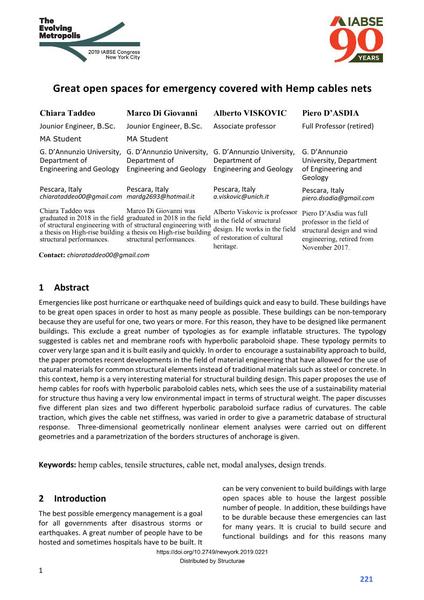Great open spaces for emergency covered with Hemp cables nets

|
|
|||||||||||
Bibliographic Details
| Author(s): |
Chiara Taddeo
(G. D'Annunzio University, Department of Engineering and Geology)
Marco Di Giovanni (G. D'Annunzio University, Department of Engineering and Geology) Alberto Viskovic (G. D'Annunzio University, Department of Engineering and Geology) Piero D'Asdia (G. D'Annunzio University, Department of Engineering and Geology) |
||||
|---|---|---|---|---|---|
| Medium: | conference paper | ||||
| Language(s): | English | ||||
| Conference: | IABSE Congress: The Evolving Metropolis, New York, NY, USA, 4-6 September 2019 | ||||
| Published in: | The Evolving Metropolis | ||||
|
|||||
| Page(s): | 221-227 | ||||
| Total no. of pages: | 7 | ||||
| DOI: | 10.2749/newyork.2019.0221 | ||||
| Abstract: |
Emergencies like post hurricane or earthquake need of buildings quick and easy to build. These buildings have to be great open spaces in order to host as many people as possible. These buildings can be non-temporary because they are useful for one, two years or more. For this reason, they have to be designed like permanent buildings. This exclude a great number of typologies as for example inflatable structures. The typology suggested is cables net and membrane roofs with hyperbolic paraboloid shape. These typology permits to cover very large span and it is built easily and quickly. In order to encourage a sustainability approach to build, the paper promotes recent developments in the field of material engineering that have allowed for the use of natural materials for common structural elements instead of traditional materials such as steel or concrete. In this context, hemp is a very interesting material for structural building design. This paper proposes the use of hemp cables for roofs with hyperbolic paraboloid cables nets, which sees the use of a sustainability material for structure thus having a very low environmental impact in terms of structural weight. The paper discusses five different plan sizes and two different hyperbolic paraboloid surface radius of curvatures. The cable traction, which gives the cable net stiffness, was varied in order to give a parametric database of structural response. Three-dimensional geometrically nonlinear element analyses were carried out on different geometries and a parametrization of the borders structures of anchorage is given. |
||||
| Keywords: |
cable net modal analyses tensile structures hemp cables design trends
|
||||

